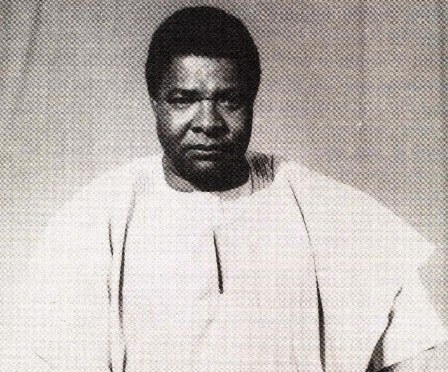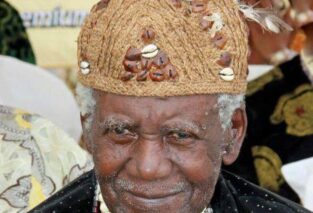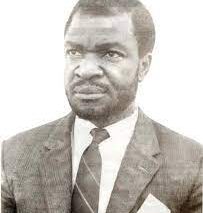
(Reprinted from Cameroon Tribune of August 11, 1987, p.2).
The following is an interview I conducted on July 19, 1987 in Douala with Dr Stephen Arnold, then Professor of Comparative Literature and Vice-Dean for Graduate Studies and Research at Canada’s second largest university, the University of Alberta in Edmonton. A scholar of African literature with a world-wide reputation, Dr. Arnold has written many articles on Cameroon’s literatures in English and French. He was then also the Editor of the quarterly African Literature Association Bulletin.
Professor Arnold, tell us what brings you to Cameroon?
I came with two of my family members and one of my doctoral students to make a pilgrimage to the grave of my friend, Dr. Bernard Nsokika Fonlon, who died not quite a year ago in Canada at the time of the Lake Nyos tragedy here. I had wanted to come to his funeral, but it was impossible to leave my administrative duties last August.
Have you made your visit to the grave yet?
Yes, I did, last Sunday, July 12, 1987. In spite of the rain and difficult road conditions, we made it to the Cathedral at Kumbo in Nso where he rests. After a moving visit to the grave, we had an audience with the traditional ruler, the Fon of Nso, to whom I conveyed my feeling of personal loss, as well as the deep respect felt by so many friends of Dr. Fonlon’s in Canada and in the U.S.A. We were received very warmly and I was profoundly touched by the Fon’s response to our pilgrimage. I told the Fon of the enormous respect Dr. Fonlon commanded among so many people far from Cameroon, and I related to him how wonderful Dr. Fonlon’s speech was when he received a doctorate honoris causa at the University of Guelph in June 1986, two months before his death.
Please, tell us something about that speech.
After receiving his honorary doctorate, Dr. Fonlon gave the convocation address. The hundreds of graduands, family members, professors and dignitaries seated in the bright Ontario sunlight probably expected, as Dr. Fonlon strode to the podium to address them, that he would lecture them on the plight of Africa. Instead, he taught them succinctly what Canada’s role in his country’s development has been over the last two decades, and went on to elaborate on Canada’s unique position in international affairs.
To a northern people quite remote from Africa and constantly attempting to define itself – not unlike Cameroon today – he gave a definition, and as was appropriate for someone sending young graduates into the world, he issued them an agenda for their futures. Better than anyone else I have ever heard, he showed Canadians how they are not Americans, and how they have much to be proud of because of that fact, in addition to many others.
In doing this, he did not, of course, name the superpower on our southern border; he did it by allusion and contrast, thanking us for our aid, which is an end in itself rather than a means to other ends. We in Canada are used to hearing our southern neighbours speak of our land as if it were theirs or, worse, as if it were completely insignificant. And we are used to hearing Africans who visit us talk only of their home. Our neighbours do not often notice our polite resentment, but our friends from your continent often indicate their pleasure at our openness to them, our curiosity and care. We, however, are not accustomed to being understood and appreciated the way Bernard Fonlon understood and appreciated us. And it is in this fact that one of Dr Fonlon’s most significant streaks of greatness lay – he was a statesman, not only of Cameroon, but of the world; nothing was foreign to him. After the speech, I had to rush back across the continent to Edmonton. We had only a short time to talk, and discussed our next encounter, which was to be in Nso. Last week, I went to that meeting to commune for a while with one of the earth’s biggest souls and to make a small gesture to signify on my part that he will not be forgotten.
I understand that you’ve made another gesture by starting an award to honour Dr. Fonlon’s memory.
Yes. At the Canadian Association of African Studies Conference, which we hosted in May at the University of Alberta, it was announced that a fund has been established which hopefully will assist in making it a little easier for contacts to take place between African and North American scholars who share Dr. Fonlon’s high ideals of academic integrity and devotion to progress. It is expected that for every dollar private individuals donate, two dollars will be added by the Government of Alberta. Privately, we have raised about $4,000 so far without even putting out a call for donations. We hope to make an annual award from the interest on the fund’s capital once it reaches about $25,000. Travel, lectures, research, etc., which are consistent with Dr. Fonlon’s example, will be aided. The award is officially to be called the ‘Fonlon-Nichols Award’. It was through Lee Nichols, who recently retired from the Voice of America, that I first met Dr. Fonlon, though I had known him in a way through reading Abbia before.
Friends of mine and I, who started the fund, saw a great affinity between the two men. In difficult conditions, neither of them ever had a lapse of integrity. Nichols worked for a propaganda agency, yet never allowed his programmes on African literature and African scientists to be used for propaganda. If we raise enough money, there will be separate awards for Fonlon and Nichols, but we see no contradiction in honouring the two together. Donations are tax deductible for Canadians and Americans and should be made to the ‘University of Alberta Development Fund: Fonlon/Nichols’, and sent to the Development Office, University of Alberta, Edmonton T6G 2J9, Canada. Cameroonians will soon have a Fonlon Society to contribute to, and our group hopes to have some link with it.
What else can you tell us about the Fonlon Society?
I do not know much more than I have said, except that I was asked to contribute an article to a memorial book, which is apparently being sponsored by the Society being formed. Actually, I was quite surprised not to find any statue of Dr. Fonlon in Yaounde, but perhaps one is being planned. It would be wonderful and appropriate if the new University of Yaounde library would carry his name. As one of his country’s fathers and one of its greatest patriots, intellectuals and statesmen, he would be so honoured in almost any other land. But, as I said, perhaps such remembrances are being planned, so I will put my surprise in abeyance.
I would like, however, to express dismay on behalf of many people that Abbia, the marvellous bilingual journal that Dr. Fonlon started, seems to have followed him to the grave. For the price of one Mercedes Benz, Abbia could appear as a high quality quarterly for at least five years. While it was coming out, it conveyed an image around the world of an intellectually and spiritually vigorous Cameroon. Eight years ago, I came to Cameroon as part of a project of the International Comparative Literature Association (ICLA) to see what literary activity there was in addition to Abbia. This was to prepare a chapter for the ICLA’s History of African Literatures in European Languages, which has just come out. Since it knew of nothing more than Abbia, the ICLA nearly left Cameroon off the map, but I convinced them that such was not likely to be the case, and my visit confirmed the validity of my intuition. Literary activity in Cameroon was burgeoning. Today, however, it appears to the outside world that stagnation has set in, even if temporarily. I know this isn’t true because, for example, we just hosted your dynamic National Director of Culture, Dr. Hansel Ndumbe Eyoh at our Canadian Association of African Studies meetings, and his splendid interventions left no doubt in the minds of several audiences that Cameroon’s literary scene is anything but stagnant. But there is nothing in writing for the world scholarly community to see, and thus Cameroon is wrongly regarded as an intellectual desert.
I have just read President Biya’s book, Communal Liberalism, with great interest and I see in it, at least implicitly, the promise that this situation will be rectified. Even in times of economic crisis, a country cannot be a nation among nations if organs like Abbia do not exist, and I think it is very short sighted to let a magazine like Abbia die. It is part of every nation’s responsibility to be involved in research and scholarly debate in internationally recognised fora, and Abbia fulfilled that function. Really, you would think that one luxury automobile could be sacrificed in order that such an essential expression of a nation’s soul and unity could be produced on a regular basis. I do hope, therefore, that Abbia, one of Dr. Fonlon’s creations, will be revived. The international scholarly community, not just Cameroon, needs it. It was a great journal, and I am fond of relating its motto, which was Dr. Fonlon’s, to my students:
Not merely to recount
what has been,
but to share in moulding
what should be.
** **



